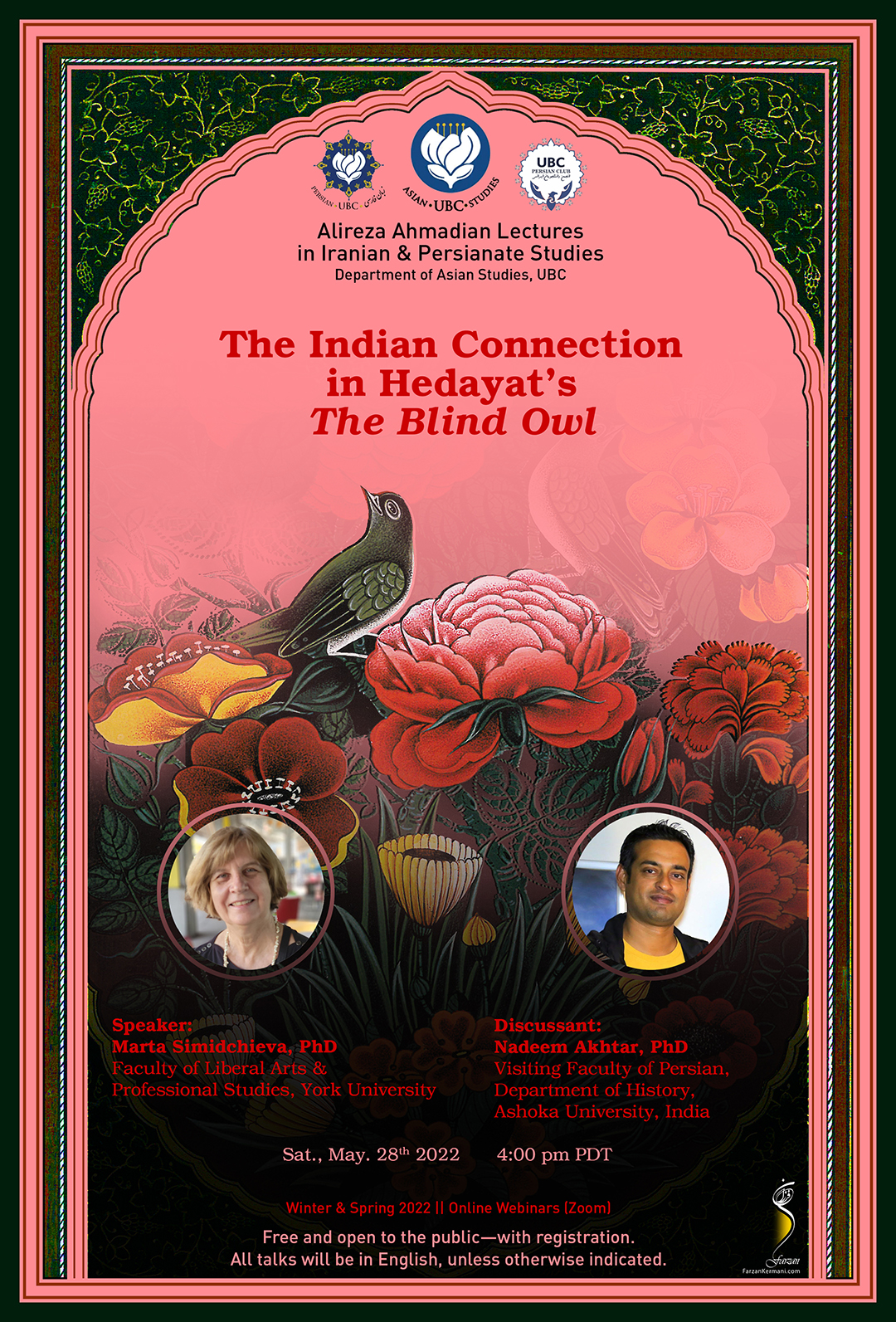

Poster design by Farzan Kermani
هند و بوف کورِ صادق هدایت
سخنران: دکتر مارتا سیمیدچیِوا، دانشکدهٔ هنرهای آزاد و مطالعات حرفهای، دانشگاه یورک
طرفبحث: دکتر ندیم اختر، استاد مدعو زبان فارسی، گروه تاریخ، دانشگاه آشوکا
رمان مدرنیستی «بوف کور» صادق هدایت الهامبخش مطالعات تطبیقی متعددی شده است که توجهشان عمدتاً بر مقایسهٔ رمانهای او با آثار غربی معطوف است. اگرچه ارجاعات به هند در این رمان فراوان است، مطالعات کمی دربارهٔ این ارجاعات انجام شده است. در این سخنرانی به این موضوع پرداخته میشود و سخنران اشیاء، نمادها و شخصیتهای مرتبط با هند را که در بوف کور برجسته شدهاند بررسی و کارکرد ساختاری و تمثیلی آنها را تشریح میکند.
The event recording is now available:
The Alireza Ahmadian Lecture in Iranian and Persianate Studies present: The Indian Connection in Hedayat’s The Blind Owl on May 28, 2022.
Sadeq Hedayat’s modernist novel The Blind Owl has inspired numerous comparative studies, mostly focusing on Hedayat’s appropriation of Western literary aesthetics, or on parallelisms between his novel and Western works. Although references to India abound in the novel, few studies have followed the South Asian connection of The Blind Owl. So far, that line of investigation is associated primarily with the publications of Iraj Bashiri, whose monograph The Fiction of Sadeq Hedayat (pub. 1984) posits a Buddhist inspiration behind the characters of The Blind Owl, and correlations between its plotline and the Buddhacarita; while earlier articles of Bashiri’s (e.g. “The Message of Hedayat,” Studies in Islam, Vol. XVII, January 1980, pp. 30-56) find also parallels with The Tibetan Book of the Dead.
The proposed paper explores another aspect of the novel’s “Indian connection”: namely, the role accorded to it in the emergence of modern Iranian literary culture and artistic sensibilities. This line of inquiry rests on the assumption that The Blind Owl is not only a work of fiction, but also a literary manifesto—a parable about Iranian cultural reform, which examines the nature of the transition from classical to modern literature and art. In the course of this exploration, the paper surveys instances in which objects, symbols, and characters associated with India are featured in the narrative, and examines their structural and allegorical function. In an attempt to determine the “horizon of expectations”( H.R. Jauss’ term) with regard to India among audiences in Iran and in Western Europe during Hedayat’s sojourn in France, where an early draft of the novel may have been written (see M. F. Farzaneh; H. Katouzian), the paper takes into account the following: the rhetorics of the “Bazgasht” among Iranian literary historians and the representation of the Indo-Persian cultural exchange in influential Iranian literary compendiums, the role of the Iranian diaspora in India in the onset of Iranian modernity; the place of India in the nationalist and nativist discourses of Iran; India and Hinduism in the European Romantic imagination during the 18th -19th c. . These considerations will play a part in defining the cultural codes, with which the novel implicitly engages.
Guest Speaker
Marta Simidchieva has a PhD in Iranian Studies form the Institute of Oriental Studies, Russian Academy of Sciences, Moscow; and a BA in English Literature from the University of Tehran, Iran, where she started her graduate work in Iranian Studies. She teaches courses on Islamic culture, religion, and civilization at the Department of Humanities, York University, Toronto. Her research interests lie in the domain of Persian literature, focusing on issues of continuity and change, modernity and tradition, literary reception, and East-West cultural interaction.
Discussant
Nadeem Akhtar obtained his PhD in Persian literature from Centre of Persian and Central Asian Studies, Jawaharlal Nehru University, New Delhi, having worked on the characters of the novels of Sadegh Hedayat, a prominent Iranian novelist. Dr. Akhtar has authored a book titled Hedayat in India, in Persian, published by Chesmeh Publication, Tehran, Iran. He has also written various research articles and reports for journals and magazines published in India and abroad, including an entry in the Encyclopaedia Iranica. He is a member of the Association of Iranian Studies and has presented his research articles in its biennial conferences held in Montreal and Vienna. Dr. Akhtar has also taught the Persian language in various Summer Schools organized for the students of George Washington University and Indian Universities in the Institute of Indo Persian Studies at Delhi, Kolkata, and Hyderabad, where he serves also as Joint Secretary of the Institute.
Should you have any questions, please contact the Department of Asian Studies at Asian.Studies@ubc.ca.